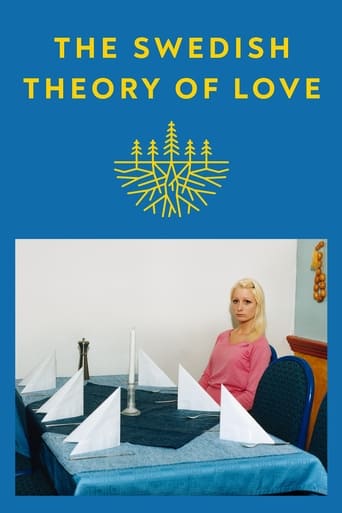Lupus_22
The documentary starts by showing one of the ideas of the liberal movements of the sixties, nominally the emancipation of individuals from relationships which were expected on old canons and thus forced on people. For example, the youngs should be independent from parents, nobody should be required to marry, and so on. If people are not forced to stay together, every actual relationship becomes authentic.
The end result seems to be that many people are very detached from one another, and social isolation, solitude, loneliness become the norm for them.
These consequences are presented as something that now has to be fixed.The film then shows a new social phenomenon happening in Sweden, which is immigration. It's not really new, but in the last few years it accelerated a lot, so it is starting to show its effects on swedish society.
The migrants are from a more traditional social background. It's not north-european traditional, it's more Africa/middle-east traditional, but it's less modern-Sweden anyway, so it is seen as a possible solution to the individualistic problem that Sweden has.An interesting insight is that a few decades ago, liberals saw a problem and pushed a solution. Today, liberals are finding that that solution is a problem, and are pushing another solution, which is the original problem they fought back in the day. Facepalm anyone?Whether you agree or not to the thesis, it is certainly an interesting documentary to watch, and gives another glimpse into what is happening in Europe at the moment.
Bear in mind that like all sources of information on current social changes, it's politicised, maybe not in your face, but at least between the lines.
this_place
This documentary palpates a well known problem here in Sweden. But one that isn't popular to spend resources on. Why? The reason might be similiar to how people sometimes vote for their dreams, as opposed to realistic outcomes. Simply put, people are busy living their lives and need more than nudging to be engaged in a problem that are actualized after retirement. I've been working in homecare-service (caring for the elderly in their homes) and isolation is definitely a significant problem amongst that population.My issues with the one-sided nature of this documentary, stems from the lack of representation of the whole picture. Almost every scene seemed to be set up to visually invoke a sense of loneliness.
Instead of portraying hipsters, inseminations and a single perspective from a doctor in Ethiophia, Gandini could've showed the positive side of life in Sweden, and more importantly explore possible solutions to emergent isolation in many urban socities.Other problems with delayed discovery of deceased and the bureaucracy in the health sector, are systematic errors and I fail to see the basis of correlation to a solitary life.A last note on the review by scissorbits ("Interesting for an immigrant in Sweden, explains a lot"), it was certainly intriguing to acquire a new frame of reference. And it touches on the current, and perhaps more acute, issue with integration. Sweden isn't socially barren, but it is a heavy challenge to make friends with the citizens, in this land of constricted groups of vikings.
Wordsmith
Let me say this first: I'm not a big fan of documentaries, because I watch movies to be immersed in a different world, away from 'real life'. In general fiction and romanticized movies only appear to do the trick for me.Having said this, I find it quite intriguing that some reviewers have issues with this documentary's depth and (lack of) opinion. Why a documentary should have this eludes me. Wikipedia has a rather simple description of a documentary: "a nonfictional motion picture intended to document some aspect of reality, primarily for the purposes of instruction, education, or maintaining a historical record".That is what this documentary does do, without an enormous pain of an opinion. To me it tells a story about a highly sophisticated society which has issues most people don't know about and most Swedes don't care much about. Maybe it's just me - that I didn't know this yet - but I thought it quite educational. I live in a country that also prides itself for it's high level of individualism (Holland), but I think the Swedes gave that a whole new dimension, with a downside called isolation. One idea that particularly stuck with me is that (a high level of) certainty leads to boredom. The apparent emptiness in many shots showed this rather subtly and in general I thought the music nicely added to some of the statements made.All in all, it may not be the best documentary made, but it is a peek into the real Sweden, which mostly gets overlooked. As another reviewer said, I think it would be wise to first watch this movie before deciding to move to the promised land, called Sweden.
scissorbits
There is a niche audience for this film- it is the new immigrant to Sweden. I myself have been living in Sweden now for 5 years and I have suffered extreme loneliness since moving here. Many foreigners will agree that it's extremely difficult to make new friends in Sweden and acclimatize to the social isolation. This film clarified the cultural significance of this phenomenon within a historical context. It answered such questions as: Why do most people not know their neighbors? Why does it feel so isolating compared to my homeland? Why does nobody talk about how strange it all seems? How did it become this way?I can understand why this wouldn't be interested to a.) someone who doesn't live in Sweden or b.) a Swede who was raised here and sees it as business as usual.But since I have wondered about all this for some time, it was elucidating. I don't agree with the contrast between Sweden and Ethiopia, however. In the film, Ethiopia is described to be poor in wealth but rich in community, while Sweden is financially wealthy yet socially barren. Societies in such countries as Ethiopia have complex social systems which are restricting in their own ways and should not be romanticized as utopian. The masturbation scene will sadly not allow me to show this to my parents, since they are old and prudish. Just a fair warning if you want to show this to your old and prudish parents too.


 AD
AD
